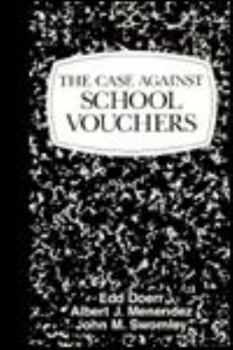The Case Against School Vouchers
Select Format
Select Condition 
Book Overview
Should public funds be used to support nonpublic education? Controversy over that question has raged since the early 19th century. In the 1990s this debate centers on elementary and secondary school tuition vouchers, sometimes called "scholarships," which feature numerous plans with varying levels of aid, but they all involve public funds being spent for nonpublic education.Voucher advocates claim that it's only fair to include nonpublic schooling...
Format:Paperback
Language:English
ISBN:1573920924
ISBN13:9781573920926
Release Date:September 1996
Publisher:Prometheus Books
Length:138 Pages
Weight:0.45 lbs.
Dimensions:0.4" x 6.0" x 9.1"
Customer Reviews
1 rating
This text does a great job of persuation against vouchers
Published by Thriftbooks.com User , 27 years ago
The Case Against School Vouchers, by Edd Doer, Albert J. Menendez and John Swormley is an enlightening book that I would reccommend. This text gives persuasive arguments against school vouchers for private schools. The first thing to impress me about this book was the 85 year combined knowledge and expetise of the authors. They were also able to state their case based on facts and reasearch rather than opinionated rhetoric. When I first read this book, I admittedly read through the eyes of someone ignorant of school vouchers and the heated debate about the subject matter. I was very surprised to learn that this subject of controversy "has raged on since the early nineteenth century." In the introduction the authors give 20 points of argument against tuition vouchers. Out of the 20, I was in agreement with 19. The authors brought up the point that vouchers promoters complain about being double taxed.(Once for the taxes which pay for public school and again for tuition of private school.) I thought this to be true and looked forward to the authors giving a heathy rebuttal; however, they did not. The authors do on the other hand offer some eye opening facts about private schools including the percentage of children who attend private school in the United States and the consensus of the American population(When asked the question properly.) While reading the introduction, I found myself perplexed. I was sure that state funds should not be used to pay for private school; but how does the state mandate a curriculum for the students in private schools? How does the state ensure every fourth grader has been introduced to the same subjects of learning such as Math, English, Social Studies, and Science with out the contributions of funds? As I read on, I found the section on text books. This in my opion seemed to be the most capturing part of the book. The book discusses how some text books used in private schools use biased or sarcastic tones when conveying lessons. For example, Dr. Martin Luther King Jr., John F. Kennedy, and Franklin D. Roosevelt are remebered in a less than glowing light. Other text books teach "praise of J. Edgar Hoover because he understood the importance of maintaining America's traditional moral values." Other text books teach that "most labor strikes in our history have been immoral." This book adresses another compelling issue: parental choice. Should parents be able to choose the school their child attends? The author does a brillant job of posing both sides of the issue. Overall, the book has many page turning points and is laced with facts and reasearch. The authors are careful to present research from various polls and organization from differnect states and years. Their argument is strong and succinct. They present the argument in a professional tone and let their work and research speak for itself. I highly recommed this text.





